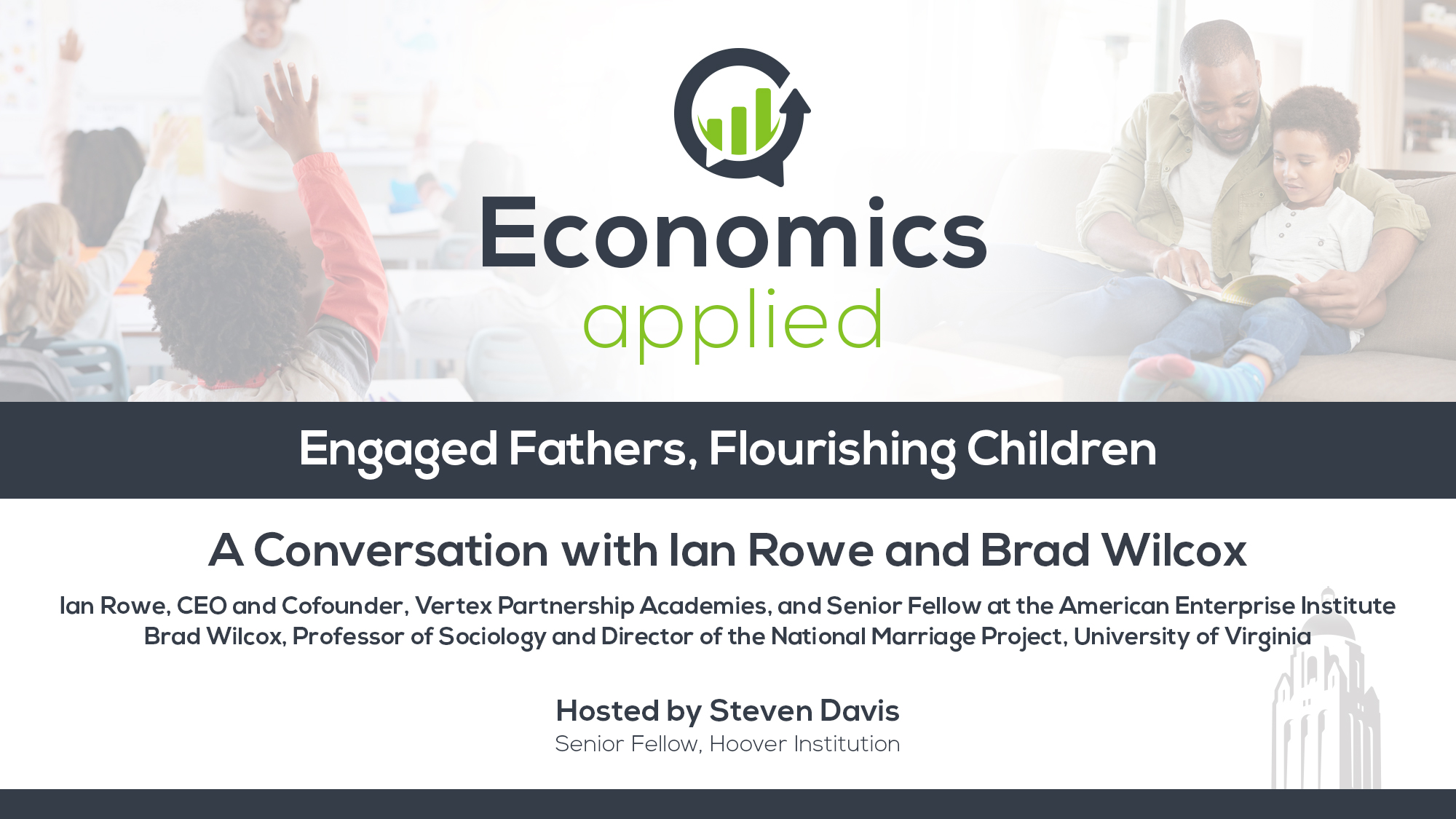- Answering Challenges to Advanced Economies
Sociologist Brad Wilcox and educational entrepreneur Ian Rowe join Steven Davis to discuss the role of fathers in helping children build happy, prosperous lives. American children from intact families – both parents present – do much better in school and have fewer disciplinary problems. Among intact families, black and white children have similar academic performance. Unfortunately, black children are much less likely to grow up in intact families. Brad and Ian share several ideas about how to strengthen fatherhood and how to help children from disadvantaged backgrounds choose better life paths.
LISTEN TO THE EPISODE
>> Stephen Davis: Many American children grow up without the benefit of an engaged father. That makes it harder for children to thrive and to build the foundation for a happy, prosperous life. In today's show, I chat with two men who have a keen appreciation for fatherhood and its effects on children.
They know the evidence, they work in the trenches, and they have some ideas for how to strengthen fatherhood. Foreign welcome to Economics Applied, a podcast series sponsored by the Hoover Institution. I'm Stephen Davis, senior fellow at the Hoover Institution and host of the show. Joining me today are Brad Wilcox and Ian Rowe.
Brad is a professor of sociology and director of the National Marriage Project at the University of Virginia. His recent book has the spirited title get why Americans Should Defy the Elites, Forge Strong Families and Save Civilization. Ian is the CEO and co founder of Vertex Partnership Academies, a virtues based baccalaureate high school in the Bronx.
He's also a senior fellow at the American Enterprise Institute. He has a recent book with another spirited title agency, the Four Point Plan for All Children to Overcome the Victimhood Narrative and Discover Their Pathway to Power. Welcome to both of you.
>> Brad Wilcox: Good to be here.
>> Ian Rowe: Thank you, Steven.
Thank you for having us.
>> Stephen Davis: Great, great to have you. And I think if I write another book, I'm going to seek your advice on titles. So it would be fun to chat about your books. But today I actually want to chat about something that's related and that's a report that you recently co authored.
It's titled Good Fathers, Flourishing Kids, the Importance of Fatherhood in Virginia. It's just published in June. You can easily find it on the web and there'll be a link to it on the webpage for this show. Let me just read the first sentence of your executive summary. And it reads as follows.
Children in Virginia are more likely to flourish when their fathers are engaged and or present. So that's the central conclusion of your report. I think it's a common sense one. It's also one that's kind of consistent with a lot of statistical evidence. And I'd like to kind of drill into some of the details in your report.
You know, let me just very briefly, you know, maybe go through some of the grim statistics and on, on the number of children in Virginia and the United States who grow up without the benefit of a father in the household and often without the benefit of a close father figure in their lives.
And here I'm just going to note for the audience that we've done a whole show on this before with Melissa Carney talking about her book on the two parent privilege where we went into some detail about the statistics on this and how growing up in a, without two parents in the household is, makes it harder for children to thrive.
So I don't want to spend too much time on that. But, but life give me the basic facts about Virginia. How many kids grow up without a father who's actively engaged in their lives?
>> Brad Wilcox: So what we're seeing right now is about one in four Virginia kids, Stephen, are living in a home without their biological father.
And over the course of their lives, you know, almost one in two kids across the state would be kind of living at some point, you know, in a non intact family, often without their biological father in the picture. So it's kind of a, that's the sort of like, you know, more sobering news for our report in terms of the demographics here in Virginia.
>> Stephen Davis: Right. Okay. So somewhat more than half of children grow up in Virginia over the course of their childhood in a stable two parent family.
>> Ian Rowe: And that mimics unfortunately across the country the non marital birth share. Still about 40% of all babies in the United States are born outside of marriage.
Now they're complicated circumstances after that. But it gives you a sense that while Virginia was the subject of this report, many of the implications, they're relevant for the rest of the country because family structure continues to be one of the primary determinants of a range of outcomes for kids.
>> Stephen Davis: Right. And, and I'll just make two, two subsidiary points here that again, they were central three themes of my discussion with Melissa Carney. One, this high rate of not of births out of wedlock and children growing up without the benefit of two parent households is something that's evolved over recent decades in the United States.
That wasn't always the case.
>> Ian Rowe: That's correct.
>> Stephen Davis: And it's also the United States is an outlier in this respect among rich countries around the world. There's not something that inevitably comes with economic development and high income that leads to low rates of two parent households because many other countries have become wealthy without experiencing this to anything like the same extent as the United States.
So that's kind of the basic statistical backdrop. And maybe you also want to then just give us again, I think it's common sense to most people, but it's useful to quantify the statistical relationships of fatherhood or having a father present in the household and the outcomes of children as best we know them.
So tell us a bit about that.
>> Ian Rowe: So as Stephen, as you mentioned, I am both a senior fellow at the American Enterprise Institute. So I study for example, factors like family formation and upward mobility. But I'm also a practitioner. I run schools. And so I'm very cognizant of all of the factors inside and outside of school that really drive whether or not a young person will be successful.
And it is still the case, similar to the Moynihan Report and the Coleman Report back in the 1960s, that family structure matters and matters significantly. It's the presence of a father, a solid married, two parent household. There's still a deep relationship between those two. So in Virginia, what was very interesting was that we found that there actually, you know, there's often this issue of the, the racial achievement gap.
We talk about that a lot in education circles, that there's almost always a difference between outcomes for black kids and white kids, Asian kids. Well, it turns out in our research in Virginia, there was no racial divide in academic performance or school problems or on discipline between black and white children that were from intact families or families that had similar presence of fathers, in particular married fathers.
That is a significant finding because if you look at most of the literature or most of the narrative, there's a sense that race matters more than family structure, when in fact, what clearly current and emerging evidence suggests that family structure is a far bigger driver of academic outcomes than race.
>> Stephen Davis: So I was struck by that, I thought that was the most stunning single empirical finding in your report. And it is contrary to, I think, the, the prevailing narratives of social inequalities in the United States. I'll just repeat it in different words. It says once you focus on intact families, and does that, when you say intact families, does that mean currently intact or a history of two parent, two.
Parents in the household.
>> Brad Wilcox: Means currently intact married biological parents. So that would be typically, I mean, I mean every now and then you've got folks who get divorced and remarried to themselves, but almost all those kids are going to be stable.
>> Stephen Davis: It's the weaker of the two conditions intact as of now.
>> Brad Wilcox: Right.
>> Stephen Davis: And, and so if you, look, if you just restrict your attention in your statistical analysis to intact two parent families with, with biological father present the outcome, the average outcomes. We should talk of the average outcomes in a statistical sense are roughly similar for white kids and black kids.
>> Ian Rowe: Yeah. And, and to just put some hard numbers on it, 85% of kids, black or white, you know, raised in, in these intact families got A's and B's. Right. In families doing well, they're doing well in school, doing well. In kids that are not under those circumstances, fewer than two thirds of those kids got good grades.
That's a meaningful difference. Now, of course there are certainly other factors, but again, usually there is this kind of racial reductionist ideology around outcomes when I think, in fact our research, and an emerging body of research elsewhere as well, is indicating that family structure matters more.
>> Stephen Davis: Okay.
So I just could, because this is such an important finding, I want to probe a little bit further into it. Is it the case that when you focus on these intact families, as you've defined it, that the income, the average income levels and the average wealth levels are similar between black and white households?
>> Brad Wilcox: So in this particular sample they would be, you know, more similar than in the population more generally, but there still would be, you know, typically some advantage that the white households would have over the black household. So it's in that sense too that, you know, the finding that we have that, you know, actually the, you know, the African American kids and intact families are, you know, doing actually in some ways a little bit better with this subsample is especially, I would say, kind of striking in that sense too.
It's just one more indication that it's what's happening with kids in schools is not, you know, as we all know, I think on this Zim conversation is not just about how much money the family has.
>> Stephen Davis: Yeah, well, that's. Well, we may understand that, but again, that kind of runs counter the prevailing narrative, which is somehow income inequality, wealth inequality is the central driver of these differences.
And at least in Virginia in your study, with respect to grades in school, that appears not to be the case. So that, that's important.
>> Ian Rowe: Right. With grades. And it's also important to mention, also related to discipline issues. So behavioral issues, you know, dysfunctional behaviors that present themselves at school.
That is, that is also significant because when you see interventions that reduce disciplinary issues, that not only affects that those individual kids, that affects the culture of the school, the learning environment. So it is equally as important that the, the impact on grades was evident, but also the reduction in disciplinary issues was also very important.
>> Stephen Davis: No, that's a really important point. I can think back to my own school days and I recall some discipline challenged classmates who really did disrupt the entire learning experience for everybody in the classroom, often because they were fearful for their own physical safety.
>> Ian Rowe: But yeah, and when the learning environment at school is your primary, or if not only opportunity to advance your knowledge, advance your life, that has really, you know, that has multiplicative impact because you're not getting the kinds of supports outside of the classroom that are so necessary.
>> Stephen Davis: Yeah. So I think, let me just make sure I understand your point there. The quality of the classroom environment which is affected by the disciplinary, the behavior of the children in the classroom may have even more important effects on the kids who come from disadvantaged backgrounds, whether it's disadvantaged by virtue of income or family structure or so on, because that's their main opportunity and vehicle for learning about the world around them and learning how to behave in a manner that will set themselves up for a successful life.
Have I got that right?
>> Ian Rowe: Correct. Well done.
>> Stephen Davis: Okay, good, good.
>> Ian Rowe: That's very, very important.
>> Stephen Davis: So now you didn't mention in your comparisons thus far the, the, you mentioned the comparison between blacks and whites. But one of the things I learned from Melissa Carney is that Asians as a group stand out with respect to the exceptionally high rates of two parent households and perhaps in other respects as well.
At least the stereotype is that there's more focused attention on education attainment, performance and so on. I think there's some truth to that stereotype. Do you have any analysis that makes this kind of comparisons not just between blacks and whites, but between those two groups and Asians? Because there are, there appear to be other cultural differences that influence life outcomes.
So can you tell us anything about that, even if it's not in your report?
>> Brad Wilcox: So Stephen, what we do see is that generally speaking, Asia, we didn't have actually enough Asian students in this particular Virginia sample. It was based upon a large national survey, and we took a sub sample from that large survey and focused on kids who were sampled in Virginia.
But there weren't enough Asian kids to get at the more granular Asian story in Virginia. But we do see in a good bit of research that Asian kids tend to do better in school on a number of different measures. We do, though, have information on family structure in Virginia, and it is the case that the kids who are being raised in Asian families are the top of the ladder when it comes to the share of Asian kids being raised in married parent families.
90% of them basically are being raised in married parent families. About 76% of white kids, about 65% of Hispanic kids in Virginia, and about 40% of African American kids in Virginia. So there are kind of differences by race and ethnicity.
>> Stephen Davis: And I missed the fraction of Asian.
Kids who are growing up in.
>> Brad Wilcox: Sorry, about 90%. So there are there.
>> Stephen Davis: Those numbers ranging. From 40% for black kids to 90% for Asian kids. And Hispanics and whites are in between. Those are huge gaps. They're huge gaps. They're not minor little things that you have to tweak the data to make it stand out.
They just hit you over the head in the data.
>> Ian Rowe: Well, this is the fundamental point, right? So when you have analysis done of educational outcomes for kids, you'll almost always see the usual, what I call the usual suspect data carries data category. So comparisons by race, comparisons by gender.
And the assumption is, whoa. Well, if there's. There's a racial disparity, that disparity must be due to racial discrimination. And you go down this pathway of interventions that are supposed to address, you know, the underlying racism. The teachers are racist, the tests are racist, but in fact, the differences in family structure within race are far more explanatory than, than the, again, the reductionist idea of race.
We're recording this on a day where New York City has just released its state test results from last year. And not surprisingly, there are once again, big academic outcomes, unfortunately by race. And unfortunately, at the lower end of the spectrum are black and Hispanic kids. And at the upper end of the spectrum, in terms of proficiency are white and Asian kids.
But nowhere in the report does it talk about the differences in family structure, just reports out by race. And so the easy assumption, always, it must be a discriminatory force going on here. And the story is far more nuanced and complex.
>> Stephen Davis: You know, I think that's just such a profound and important point, Ian.
The, the category, the, the categorical way we break down these outcomes and statistical analyses influences the kinds of explanations that come to mind. And I think these. Look, I'll speak. I'm an economist. I'm a professional economist. I've spent most of my career in academia. There is, within my field and within academia at large, there is very much a ready kind of an almost automatic, let's look at outcomes by race.
>> Ian Rowe: Yeah, it's knee jerk.
>> Stephen Davis: It's just. Yeah. And then let's evaluate ourselves on those grounds. Now. Now, sometimes it's because the data sets that we might have available to us are much better at measuring race. And gender is a pretty easy thing to measure in most cases.
Race, ethnicity, a little bit harder, but typically available. And it's much harder to measure family structure sometimes, so there's sort of that explanation. But I do think, and here I'm speaking as a member of the tribe of professional economists and social scientists. They've been overly focused on race and gender without enough attention to family structure and more generally the environment in which kids grow up, so-
>> Ian Rowe: Yeah, well, let me add, you know, one of the reasons I think our Virginia report is so important is that you just said something very important that's kinda the typical categories are race and gender. They're easier to access. And you said, you know, sometimes family structures are more difficult to access.
That could be a reason. But it's also because many social scientists don't necessarily want to report out information by family structure because it then leads to some Pretty prickly conversations.
>> Stephen Davis: Yes.
>> Ian Rowe: Because when we talk about differences for kids and academics and a whole range of outcomes, and you start saying, well, married to parent households, as Melissa Kearney does, you know, kids raised in marriage to parent households, significantly better outcomes in single moms or other family arrangements.
There are those who say, well, you're blaming the victim. You know, you're demonizing single moms, you're blaming single mom. You know, they're the ones that are working hard. They're the ones that are at least there. Why are you, you know, basically jumping all over them when that's unfair?
And so there's a tendency not to talk about family structure at all. And that's a real loss. And so I think it's always important to say, you know, when we share this kind of data, which is just the data, we're not doing this to blame single mothers. We're really just trying to show what are the factors that truly drive outcomes for kids.
>> Stephen Davis: Thank you for saying that, Ian, because Melissa is also quite careful to make this point. She did on the podcast. You know, we should recognize there are lots of single parents out there struggling mightily to provide the best environment they can provide for their children growing up.
And we should applaud their efforts, and I do applaud their efforts. And in some cases, you know, depending on the character of one parent or the other, the kids are probably better up growing, you know, with just one, the one parent than the two. So we should recognize all that.
And nonetheless, having said all that, the facts are as they are and they are strongly suggestive that other things equal two parents engaged in the child's life is better than one. And hence we should probably try to facilitate that. We'll get into some of that.
>> Ian Rowe: Yeah, sometimes I think it's a data story, but sometimes it's always, it's just as much of how we tell the story, how, how we are able to communicate this vital information about the best environments for kids without putting people on the immediate defensive.
We say that there are exceptions to the rule, but we have to recognize the rule, that married. So, you know, I go further than just two parent household, but married, healthy, married, two parent households, data wise. And of course there are exceptions are the best environment for kids.
They just are. And we have to become comfortable as a society to say that without putting some folks on the defensive.
>> Stephen Davis: Right. I agree with all that. We should also just recognize here that establishing causal effects is challenging because some households have only a single parent because they've been hit by other shocks.
The most extreme example is the death of one of the parents, which is a traumatic experience for a child, probably doesn't lend itself to better outcomes, and yet it's not anybody's fault. But more generally, life happens to people and we can't always achieve this ideal of a two parent household, but we still want to recognize its benefits.
And when we can't achieve two biological parents living with the kid in the household, then we want to think about other ways to provide some of those benefits. And we'll get into that as well. I think so, yeah. This is a very treacherous terrain and hopefully we can do a good job of presenting the facts but navigating the, you know, the pitfalls here and discussing this topic.
>> Brad Wilcox: Yeah. It's important to note, Steve, there's also kind of, there's, we've talked about kind of individual level effects, you know, to some extent already today, but it's important to sort of appreciate that there is evidence for ecological effects as well when it comes to family structure. So kind of above and down whether or not individual kids are affected by single parenthood, for instance.
We see is that communities and neighborhoods where there are more single=parent families are more likely to flounder. And those where there are more two-parent families are more likely to flourish. There's, you know, evidence from Raj Chetty, for instance, which we all know about, kind of telling us that kids from communities where there are many more two parent families are more likely, if they're born poor, to rise into affluence, that rags to riches story.
Whereas kids who are born poor and they're surrounded by single parent families are way more likely to remain stuck in poverty, that kind of vicious cycle of poverty as they move into adulthood. So this is why a poor kid growing up in In Atlanta is much more likely to remain stuck in poverty as that poor kid moves into adulthood.
And by contrast, a poor kid who grows up in the Salt Lake City metro area is more likely to rise, you know, into affluence because that poor kid is more likely to be surrounded by, you know, two parent families that can help him navigate the pathway into adulthood.
And this is again from Raj studies work at Harvard. So there's both a kind of individual and ecological story that's playing out here when we think about the role that family structure plays in kids lives and communities lives.
>> Stephen Davis: In the jargon of economists, I can't resist their positive externalities outside the family itself.
>> Brad Wilcox: Exactly, exactly.
>> Stephen Davis: Two parent family that it, it spills over to benefit other kids in the neighborhood whether they come from two parent families or single parent families. So I, I think that. Go ahead Ian.
>> Ian Rowe: And for your, for your listeners that the Chetty study that Brad is referring to, I think it's called, you know, where is the land of Opportunity?
And it's quite extensive in that they analyze the tax records of 40 million children and their adults. So imagine 40 million children, adults, every kid born in the United States from 1980 to 1982. They were able to measure what was the income levels of their parents between 1980 and 82 when they were born.
Then they looked at their income records 30 years later to understand which economic quintile were they earning into at that point. So this kind of rats to riches, if you were born in the lowest economic quintile 30 years later, what's the likelihood you were in the top economic quintile?
And they mapped the country into more than 700 different what, what they called commuting zones. And as Brad said, those areas with the highest levels of upward mobility, places like Salt Lake City, San Jose, those with some of the lowest levels, places like Atlanta and Milwaukee had these common characteristics.
And the common characteristics especially for high rates of upward mobility were places where you had high rates of marriage. And so this neighborhood effect or ecological effect that Brad is referring to is a very real one. And again it's not to demonize, it's just what the data is showing.
Marriage positively impacts kids within the marriage as well as can affect, positively affect kids everywhere.
>> Stephen Davis: Here's why we should just note that again it's challenging to establish the exact causal magnitude at issue here. So I don't want to overstate the evidence, but kind of the face value interpretation of the evidence, which you would have to work pretty hard to Overturn, I think is that communities that have high percentages of stable, intact two parent families foster upward mobility for their own kids in those families, but also kids more generally in the neighborhood.
That's what you mean by these ecological effects.
>> Ian Rowe: Yes. And it's true that if you do look at the Chetty study, you know, there are other factors like the presence of school choice, for example, access to high quality schools, which would make sense, high levels of faith. So there are other factors, but it is undeniable that the strength of families, in particular married to parent households, plays a significant role in upward mobility.
>> Stephen Davis: Right. So let me, let me turn. There's another sticky treacherous topic that you address in your report and that's the connection between incarceration rates and missing fathers or I'm not sure you, that's your term, but fathers who are not present or as engaged in their children's lives as we might like them to be.
So why don't you tell us about that connection?
>> Brad Wilcox: Yeah, so I mean we do see that there is a kind of, you know, gap between non resident fathers, for instance, Stephen, and residential fathers. So my colleague Dr. Wendy Wang at these are family studies, I think finds that it's something like about non resident dads spend about 30 minutes of in person kind of time with their kids in the average week compared to about eight hours of in person time for residential fathers in terms of more kind of like in person interaction kind of activity.
So there is a pretty big gap. We see will be one example of this. Now of course, we all know that there are again, residential dads who are kind of indifferent to their kids and non resident dads who are doing a great job with, you know, with their children and being in touch with them.
But this is sort of one way in which we sort of see that there are some real noteworthy gaps in American fatherhood when it comes to, in this case, family structure and dad's connections to their kids.
>> Ian Rowe: Yeah. And, and the numbers are, you know, they're about 100,000 children in Virginia that have at least one parent and it's usually the dad that is in jail or you know, in, in the, in the system in some way.
And.
>> Stephen Davis: Right.
>> Ian Rowe: Not surprisingly, those kids, fathers spend significantly less time with their kids. So it's not only a matter of presence, but there are probably other issues that exist with that community too in terms of behavior or, or domestic violence or other issues. So not that's, that is a, that was an expected finding, but the degree to which it's happening is still pretty surprising.
>> Stephen Davis: Okay, can you tell us more about the, the extent of the relationship between incarceration either? Currently incarcerated, obviously they can't be present in the physically present in the children's life at the moment if they're incarcerated. But I presume past episodes of incarceration also can disrupt the parent, the fathers most often relationship to the child with lingering effects on how engaged they are even when the father isn't currently incarcerated.
How, how much of this gap, excuse me, how much of the single parent rate that you find in Virginia is traceable directly or indirectly to incarceration?
>> Brad Wilcox: What we do find in the, in the study is that kids who have a history of having a parent, usually their father, incarcerated, about half as likely to get good grades in school, you know, about five times more likely to be depressed and about twice as likely to have their parents contacted for school problems.
We also find too that a good bit of the incarceration sort of story is related to family instability. So in the kind of relatively more rare cases where maybe a parent is incarcerated, again, usually a father, but the parents remain stably married, those kids did better than the cases where, you know, that incarceration was linked to or led to single parenthood as well.
>> Stephen Davis: I don't think you answered the question I was trying to ask, but, but maybe, maybe, maybe it's not something you covered in your study.
>> Ian Rowe: You're asking what percent?
>> Stephen Davis: Yeah. Is this, is this like the single parent rate?
>> Ian Rowe: I don't have that data.
>> Stephen Davis: 20% or what?
I'm just trying to get a handle on that.
>> Brad Wilcox: Yeah, I'd have to go back and look at the details. Yeah. So some decent minority of the kids who are non attack families have incarcerated parents in Virginia, but I don't know, I can't remember the precise number.
>> Stephen Davis: All right, well, that's fine.
So I think the central point you're leaving with us is incarceration is also, not surprisingly, not associated with high quality outcomes for the children.
>> Brad Wilcox: Right. I'm just looking back through our notes here on the report. And so, yeah, one in four kids in father absent families in Virginia had a parent who had been incarcerated at one point.
So that's certainly a large minority of the kids in father absent homes across the state of Virginia have had some kind of connection with, you know, with, you know, prison or jail.
>> Stephen Davis: All right, so if we're thinking about, in terms of Venn diagrams, this overlap between didn't grow up in a intact two parent household and had a father who was incarcerated, that's a pretty big overlap.
>> Brad Wilcox: Yeah, there's certainly an overlap. And of course, one of the things that I found in my own work in my book Get Married, is that today young men who are raised in a non attack family, Stephen, are more likely to go to prison or jail than they are graduate from college.
And by contrast, young men who are raised by their stably married parents essentially in an intact family are four times more likely to graduate from college than they ever spend any time in jail. And so.
>> Stephen Davis: Those are some pretty sobering numbers.
>> Brad Wilcox: Yeah, so there's certainly a connection between family instability and incarceration for young men in this country.
>> Stephen Davis: So let's turn to your ideas for how to foster fatherhood, productive fatherhood, and generate the benefits that come with an engaged father for children. You've got a few ideas in that respect, so why don't you lay some on the table and we can chat about them.
>> Ian Rowe: Yeah, so one of the concepts, again, as a practitioner, someone who runs schools, I also think about not, not just, you know, what, what role does family structure, fatherhood play, but what can we actually do, especially for the rising generation, so that they're not on this treadmill of disadvantage.
And so I now run high schools and there's this concept I've created called basically the Life deciding Decade. That period of time from age 14 to 24, that the decisions that young people make during that period of time around topics such as how well, you know, how hard they work at school, the relationships that they have, faith formation, their work ethic, those things really matter.
And the quality of those decisions during that period of time have an outsized impact over the rest of your life. They're not completely determinative. But if we can really hone in, in that period of middle school, high school and the first few years of college or the first few years of work can make a huge difference.
So during that time, that's where things such as school choice make can make a huge difference. You know, I run schools in the Sound View section of the Bronx where the non marital birth rate is 85%. So nearly nine in 10 babies are born outside of marriage. It's also a district in New York City where there is no school choice that the state has placed a cap over the ability to open, for example, new charter schools.
And this district where only 7% of kids graduate from high school ready for college, meaning that about of the sort of 2,000 or so students that start ninth grade in this district, four years later, 93% have either dropped out or they did earn their high school diploma, but still cannot do math nor reading without remediation if they were to go to school.
So if those are the conditions, it makes it really hard for a young man or a young girl to get on a pathway to success. So some of the ideas both in the report and just generally, and this is also what the Chetty work found, access to high quality schools has got to be one of the first rungs of the ladder to get on a healthy pathway to young adulthood.
The other thing that we do in our schools and we recommend in the report is that we teach something called the success sequence. And for your listeners, that's data that's now been replicated in lots of settings as progressive institutions like Brookings to the American Enterprise Institute. There seems to be consensus that if a young person finishes at least their high school degree, then gets a full time job of any kind, so they learn the dignity and discipline of work, then if they have children, if they get married first, that series of decisions, education, work, marriage, then children, 97% of millennials avoid poverty and the vast majority enter the middle class or beyond.
You can dissect this study's been done. Success sequence has been studied by race and it shows in, in the black community, the numbers are still north of 90%. So we teach that in our schools, particularly for young people where they're not seeing many models of families that are seeing married intact households.
So those are a couple of things that we could be doing in school. A giving school choice so that you just have more opportunity to access better schools, get on a better academic pipeline, but also actually talking about these things around the benefits related to family formation done the right way.
>> Stephen Davis: So a couple things there. One, I understand the success skills that you're teaching are things that for some children they're going to acquire in their household growing up from their parents. But for other children they're not. Especially children growing up in a single parent household, even if the parent wants to impart these skills, there's only so much time energy in the day.
And if you have to do it all yourself. It's a lot harder.
>> Ian Rowe: Correct.
>> Stephen Davis: You've got two parents. So, so I, so, so you. We need to recognize that in our society, much as we'd like children to get these skills inside the family, some of them don't, many of them don't.
And so you're saying, look, these are critical life skills and if they don't, they're not going to get it in the family at home. And many of them don't. We got to teach them in the schools.
>> Ian Rowe: Absolutely. And, and, and you should know that we've actually faced criticism and opposition for teaching this content.
>> Stephen Davis: So tell me, tell me about that.
>> Ian Rowe: Well, it's similar to the, you know, what we talked about earlier. There's some hesitation because the thing is, if you start providing statistics that say that, you know, this series of decisions, including marriage and children and, you know, children within marriage leads to more likely, as you say, causality is hard to pin down, but more likely leads to better outcomes for kids.
There are some who say, wait a minute, you're demonizing. You're going to be teaching these kids, the vast majority of whom did not grow up in families that followed the success sequence. You're going to be shaming them, you're going to be embarrassing them, and that's not right. And therefore you shouldn't teach this content at all.
So there are those who are not actually supportive of teaching this content. I feel that that's an incredibly hypocritical because many of the people who are often saying these things practice the success sequence within their own lives. I'll give you a very quick story. In 2019, we were studying really good models of high schools in order to develop Vertex Partnership academies that we launched in the Bronx.
And we were at a high school in New Orleans. I visited a class of ninth graders, predominantly low income, black, Hispanic, Asian kids. And we, this was at a time where we were teaching. The success sequence in eighth grade. And we're getting lots of pushback. And so I asked these students in New Orleans, these ninth graders, I said to the students, if you knew that there were a series of decisions in your control, that when kids just like you followed that series of decisions, 97% avoided poverty, would you want to know what those decisions are?
And the students looked at me and they said, well, of course, yeah. Why wouldn't I want to know?
>> Stephen Davis: I can see your effectiveness as an educator coming through here. Good job.
>> Ian Rowe: Right, right. But then I said, well, there's some grownups that think that I might make you uncomfortable, that maybe I'll embarrass you.
So you know what? I'm not going to tell. And the kids looked at me like I had a third eye. What is wrong with you? You tell us. You tell us. Let us decide if that information can be useful. And so we then proceeded to have this amazing conversation about this thing called the success sequence.
So we talked about this series of decisions yield, this likelihood of economic mobility, this series of decisions in a different order, right? So we teach in what I call a descriptive fashion, not prescriptive, you know, and so. But at the end of the session, these kids felt that they'd been treated as future decision makers within their own lives.
And that's the essence of it.
>> Stephen Davis: So that's a great story. But this distinction between prescriptive and descriptive. So, you know, we can think back to decades in the United States in which being a single mother was stigmatized, having a child out of wedlock was stigmatized. And that would be.
That's a socially prescriptive approach.
>> Ian Rowe: Correct.
>> Stephen Davis: And what you're saying is, look, single, being a single mother, especially say a single teen mother, is a rough way to start life, but you can tell people the facts without stigmatizing them.
>> Ian Rowe: We have to figure out a way to do that.
>> Stephen Davis: To do that and let them make their own decisions from that. That's what I hear you saying. That seems like such a sensible.
>> Ian Rowe: Particularly.
>> Stephen Davis: It's hard to imagine you get pushback. But I believe you when you say you get pushback. Go ahead, Brad.
>> Brad Wilcox: Yeah, no, you do get pushback, you know, in certain.
And, you know, Ian's had more kind of practical experience with this in the school context, but certainly kind of in the academic and journalistic worlds, there's a lot of folks who are offended by the success sequence, especially kind of a stress on the value of putting marriage before the baby carriage.
So that's why it's controversial, but we've seen the data is that, for instance, your odds of being poor as a young adult are 60% lower if you put marriage before the baby carriage, even controlling for factors like family income, growing up, your education, your labor force status. And for folks who are kind of more skeptical on the left of this idea, Stephen, what we see in the research is that marriage is important, important for families, young adult families, in large part because it's a key source of family stability.
And so if people are getting married before having kids, they're way more likely to end up, you know, as a single mom in their 30s and as a non resident dad in their 30s. And it's that kind of pattern of family stability that, you know, basically gives them more economies of scale.
It reduces their costs related to having some kind of court case, with a family lawyer and a judge and keeping up the cost of two households, etc. So there's just a way in which in the data, putting marriage before the baby carriage helps to foster family stability in ways that tend to make both the kids lives more financially stable and also the adults lives as well.
>> Ian Rowe: Well, let me just say one thing about the success sequence, because the marriage and kids components of the success sequence get a lot of attention and most of the controversy. But remember, it also says work, education, work, marriage and children. And for some kids that is an obstacle as well.
Which is why another recommendation we have for the report, and it's what we do in our own high school, is that we make it more possible for kids in high school to actually have apprenticeships in given industry so they can earn credentials. For example, in our school, students can study biomedical science, computer science, cybersecurity.
They can actually earn industry credentials, which makes it possible for them to earn a job immediately out of high school. That doesn't mean that they're putting off college forever. It's just that we have to break this idea that college has to be the only immediate option after high school.
So I thought that was important to say that work is another thing we should be focused on, particularly for young men, but it also applies to young women. There's a lot of data that says young men who are able to work right out of high school have, have many benefits going forward, including enhancing their marriage ability.
>> Stephen Davis: Yeah, and even working in school. I mean, we make, we, we put up we as society and with various policies, including minimum wage laws, create lots of barriers to young people working part time. I've been Working since I was 11, even 10, selling newspapers on the street.
I don't think it hurt me. Sometimes I had to do jobs I didn't like. And for someone of my generation, it's not all that unusual that you worked in high school unless you came from a really affluent family. But it is unusual in many quarters today, and I think it's unfortunate.
Some of the basic life skills people need to learn. You referred to earlier in how do you present yourself in a professional manner? How do you, how do you treat others? Courteously and respectfully?
>> Ian Rowe: How do you dress?
>> Stephen Davis: And how do you dress? Yeah.
>> Ian Rowe: How do you greet someone?
How do you have a professional conversation?
>> Stephen Davis: The importance of showing up on time.
>> Ian Rowe: Exactly. Responsibility.
>> Stephen Davis: Is a pretty important skills and work is for many young people, kind of where you learn them. Yeah, so. Okay, so one policy prescription which makes a lot of sense to me is tell students in the classroom about the basic skills that help you have a successful life.
You call it the success sequence. I infer from what you've said that many, perhaps most public schools shy away from doing that.
>> Ian Rowe: That is correct. There's a tendency to focus on college and career. There's a, there's a comfort level there. But once you move into marriage and children, there is a concern around moralizing or getting into areas, you know, stay in your lane kind of messaging.
And for us.
>> Stephen Davis: But it's so funny because, at least in my perception, and perhaps I'm wrong, our public schools moralize about other things.
>> Ian Rowe: Yes, they do. Exactly.
>> Stephen Davis: Environmental matters.
>> Ian Rowe: Correct.
>> Stephen Davis: You know, but they don't want, they resist moralizing about this. Very practical advice to help kids have a successful life.
Okay, so that's one policy idea which can manifest itself in many ways, but makes perfect sense to me. What are some others?
>> Brad Wilcox: So we also talked to you about kind of the value of doing some kind of PSA campaign both around the success sequence on the one hand, but also around kind of fatherhood more generally.
Just kind of, you know, basically letting people know that dads play an important role in their kids lives in terms of everything from discipline to playing with their kids physically. There's just a whole bunch of evidence that indicates that, you know. A variety of things that dads do in their kids lives redound to the benefit of children.
So I think it'd be helpful for the broader population to be more apprised of that in terms of appreciating dad's roles in part, I think, because it will make both men and women, husbands and wives, do more to kind of keep their marriages strong and together as they navigate the challenges of family life.
Then we too talk about the value of having some kind of parenting program. In Virginia prisons and jails, especially prisons where people are often in for a longer spell and especially as they kind of get prepared to come out, there is work done with, for instance, what's called the Parenting Inside out program in Oregon, where they provide a range of parenting skills and other kinds of relationship skills to prisoners.
And that particular program has had evidence from randomized control trials indicating that men who've gone through that program have better relations with their kids once they're out, and they're less likely to be rearrested for drug use and other offenses in the wake of going through that program. So we kind of recommend a similar program would be implemented in Virginia prisons as well.
So these are some of the kinds of things that we're encouraging the state to think about doing.
>> Stephen Davis: That also sounds like a very sensible idea. I would guess that most of these fathers in prison, they want to be better fathers. I would also guess that many of them grew up without a fully engaged father.
So you don't, you don't learn how to be a father, just you aren't born learning how to be a good father. If you are fortunate enough to have a role model in your life, well, then it may be relatively natural to be a good father to your children.
But if you didn't grow up with that, then it's maybe something you need to learn as an adult. And, and for these men in prison, a large fraction of them, I'm guessing, did not grow up with a fully engaged father.
>> Brad Wilcox: Right.
>> Stephen Davis: And so there's. This is a population, they're a captive population anyway.
It's not like they've already lost their freedom through some serious offense that they've been convicted of. So why not offer them a path to being a better father? And I'm sure many of them are eager to do that.
>> Brad Wilcox: Exactly, 100%, yeah.
>> Ian Rowe: And then just one final.
So in addition to school choice, teaching, the Success Sequence, offering apprenticeships, the PSA campaign, we also couldn't ignore the relatively recent larger impact of pornography, particularly online, and the impact it's having on young men and the ability to form relationships. And so at the least, we should have some kind of required age verification so that there's, you know, you just limit the number of young kids who are getting exposure to content that is, you know, clearly inappropriate and skews their sense of what relationships should be or can be.
>> Stephen Davis: Right, right. That one might be more challenging to implement.
>> Ian Rowe: Not necessarily. I mean, there are lots of things that we're now able to do technology wise. Creating some kind of age verification is achievable. And states like Texas, there are states that have made progress.
>> Stephen Davis: Is that right?
Okay. Okay, good to know. Okay, well, look, I've enjoyed the conversation. Clearly, you guys, as I said, you're, you know, the evidence, you're in the trenches and you've set forth some, I think, common sense ideas for trying to promote fatherhood and, and the benefits that flow from it from engaged fathers for.
For the children directly, but also for the communities in which these fathers reside and engage with others. So.
>> Ian Rowe: Yeah, I think the adjectives here are important, ranging from married, engaged, resident, incarcerate. You know, so, yeah, father fatherhood is, unto itself is, you know, most men have the ability to become fathers.
The question is.
>> Stephen Davis: Yeah, I take your point.
>> Ian Rowe: What's the adjective?
>> Stephen Davis: What comes with it?
>> Ian Rowe: Yes.
>> Stephen Davis: Okay, so engaged, present fathers.
>> Ian Rowe: Or even married. Even better.
>> Stephen Davis: Married. Yes, but when that's not feasible, at least engaged in their lives.
>> Ian Rowe: Exactly, exactly.
>> Stephen Davis: Right, good.
Any last comments from you, Brad?
>> Brad Wilcox: Just one thing I want to say, I want to add. Stephen. So we're seeing, actually, I have a piece in the Atlantic that just came out two weeks ago that talks about a kind of marriage comeback. We talked about some sobering news about dads and marriage.
You know, that's certainly relevant. You know, a lot of kids, both here in Virginia and across the country, are going to be raised without their dad in the picture. But we are seeing in recent years a kind of uptick in marital stability, a decline in single parenthood, decline in single motherhood, and a slight uptick in the share of kids who are being raised by their own married parents.
So, and this is actually particularly true for African Americans, both in Virginia and then across the US There are some, I think, pieces of good news to point to on their highs. And we're hoping to, Ian and I, in our own ways, to kind of, you know, make this kind of trajectory keep going in the right direction.
>> Stephen Davis: Good. Well, it's great to end on a positive note there, and thanks for joining this podcast. And more importantly, thanks for all your great work in this area. Keep it up.
>> Ian Rowe: Thank you, Steven.
>> Brad Wilcox: Thank you, Stephen.
>> Stephen Davis: Take care.
ABOUT THE SPEAKERS
Brad Wilcox is Melville Foundation Jefferson Scholars Foundation University Professor of Sociology and Director of the National Marriage Project at the University of Virginia, Future of Freedom Fellow at the Institute for Family Studies, and a nonresident senior fellow at the American Enterprise Institute He studies marriage, fatherhood, and the impact of strong and stable families on men, women, and children.
Ian Rowe is a Senior Fellow at the American Enterprise Institute, where he focuses on education and upward mobility, family formation, and adoption. He is a cofounder of Vertex Partnership Academies, a network of virtues-based International Baccalaureate high schools inaugurated in the Bronx in 2022 and cofounder of the National Summer School Initiative.
Steven Davis is the Thomas W. and Susan B. Ford Senior Fellow and Director of Research at the Hoover Institution and Senior Fellow at the Stanford Institute for Economic Policy Research (SIEPR). He is a research associate of the NBER, IZA research fellow, elected fellow of the Society of Labor Economists, and a consultant to the Federal Reserve Bank of Atlanta. He co-founded the Economic Policy Uncertainty project, the U.S. Survey of Working Arrangements and Attitudes, the Global Survey of Working Arrangements, the Survey of Business Uncertainty, and the Stock Market Jumps project. He also co-organizes the Asian Monetary Policy Forum, held annually in Singapore. Before joining Hoover, Davis was on the faculty at the University of Chicago Booth School of Business, serving as both distinguished service professor and deputy dean of the faculty.
RELATED SOURCES
- Good Fathers, Flourishing Kids: The Importance of Fatherhood in Virginia by Brad Wilcox, Nicholas Zill, Richard Reeves, Ian Rowe, Gerard Robinson and Linda Malone-Colon, 2025.
- Get Married: Why Americans Should Defy the Elites, Forge Strong Families and Save Civilization by Brad Wilcox, 2024.
- Agency: The Four Point Plan (F.R.E.E.) for ALL Children to Overcome the Victimhood Narrative and Discover Their Pathway to Power by Ian Rowe, 2022.
- The Two-Parent Privilege: How Americans Stopped Getting Married and Started Falling Behind by Melissa Kearney, 2023.
- “Where Is the Land of Opportunity? The Geography of Intergenerational Mobility in the United States,” Raj Chetty, Nathaniel Hendren, Patrick Kline and Emmanuel Saez, Quarterly Journal of Economics, 2014.
- “Why Marriage Survives: The Institution Has Adapted and Is Showing New Signs of Resilience,” Brad Wilcox, The Atlantic, 29 July 2025.
- Natonal Marriage Project, University of Virginia
- Vertex Partnership Academies
ABOUT THE SERIES
Each episode of Economics, Applied, a video podcast series, features senior fellow Steven Davis in conversation with leaders and researchers about economic developments and their ramifications. The goal is to bring evidence and economic reasoning to the table, drawing lessons for individuals, organizations, and society. The podcast also aims to showcase the value of individual initiative, markets, the rule of law, and sound policy in fostering prosperity and security.
For more information, visit hoover.org/podcasts/economics-applied.


















